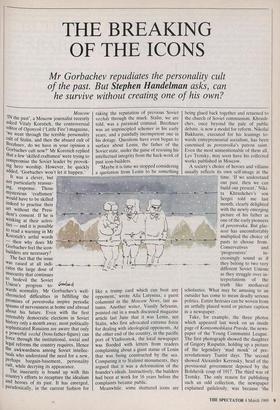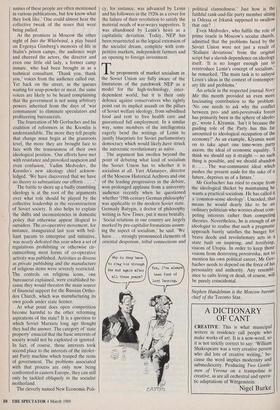THE BREAKING OF THE ICONS
Mr Gorbachev repudiates the personality cult he survive without creating one of his own?
Moscow IN the past', a Moscow journalist recently asked Vitaly Korotich, the controversial editor of Ogonyok (Tittle Fire') magazine, `we went through the terrible personality cult of Stalin, and then the absurd cult of Brezhnev, do we have in your opinion a Gorbachev cult now?' Mr Korotich replied that a few 'skilled craftsmen' were trying to compromise the Soviet leader by provok- ing hero worship. However, he quickly added, 'Gorbachev won't let it happen.'
It was a clever, but not particularly reassur- ing, response. Those mysterious `craftsmen' would have to be skilled indeed to practise their art without the Presi- dent's consent. If he is winking at their activi- ties — and it is possible to read a warning in Mr Korotich's artful words then why does Mr Gorbachev feel the icon- builders are necessary? The fact that the issue was raised at all indi- cates the large dose of insecurity that continues to bedevil the Soviet
Union's progress to- abw"'"( wards normality. Mr Gorbachev's well- chronicled difficulties in fulfilling the promises of perestroika inspire periodic spasms of nervousness at home and abroad about his future. Even with the first ostensibly democratic elections in Soviet history only a month away, most politically sophisticated Russians are aware that only a powerful vozhd (boss-father-figure) can force through the institutional, social and legal reforms the country requires. Hence the awkwardness among Soviet intellec- tuals who understand the need for a new, perhaps bargain-basement, personality Cult, while decrying its appearance.
The insecurity is bound up with this country's efforts to recapture the idealism and heroes of its past. It has emerged, paradoxically, in the current fashion for
raking the reputation of previous Soviet vozhds through the muck. Stalin, we are told, was a paranoid criminal. Brezhnev was an unprincipled schemer in his early years, and a painfully incompetent one in his dotage. Questions have even begun to surface about Lenin, the father of the Soviet state, under the guise of rescuing his intellectual integrity from the hack-work of past icon-builders.
'Maybe it is time we stopped considering a quotation from Lenin to be something
like a trump card which can beat any opponent,' wrote Alla Latynina, a guest columnist in the Moscow News, last au- tumn. Another writer, Vassily Selyunin, pointed out in a much discussed magazine article last June that it was Lenin, not Stalin, who first advocated extreme force for dealing with ideological opponents. At the other end of the country, in the pacific port of Vladivostok, the local newspaper was flooded with letters from readers complaining about a giant statue of Lenin that was being constructed by the sea. Comparing it to Stalinist monuments, they argued that it was a deformation of the founder's ideals. Instructively, the builders had been at work for 16 years before the complaints became public.
Meanwhile, some shattered icons are
being glued back together and returned to the church of Soviet communism. Khrush- chev, once beyond the pale of public debate, is now a model for reform. Nikolai Bukharin, executed for his leanings to- wards entrepreneurial socialism, has been canonised as perestroika's patron saint. Even the most unmentionable of them all, Lev Trotsky, may soon have his collected works published in Moscow.
A society's choice of heroes and villains usually reflects its own self-image at the t time. 'If we understand our past, then we can build our present,' Niki- ta Khrushchev's son Sergei told me last month, clearly delighted with the newly emerging picture of his father as one of the early pioneers of perestroika. But glas- nost has uncomfortably multiplied the choice of pasts to choose from.
Conservatives and `progressives' in-
Take, for example, the three photos which appeared last week on an inside page of Komsomolskaya Pravda, the news- paper of the Young Communist League. The first photograph showed the daughter of Grigory Rasputin, holding up a picture of the legendary 'mad monk' of pre- revolutionary Tsarist days. The second showed Alexander Kerensky, head of the provisional government deposed by the Bolshevik coup of 1917. The third was of Trotsky. The only reason for publishing such an odd collection, the newspaper explained guilelessly, was because 'the
names of these people are often mentioned in various publications, but few know what they look like.' One could almost hear the collective tweak of the noses that were being pulled.
At the premiere in Moscow the other night of Into the Whirlwind, a play based on Evgenya Ginsberg's memoirs of life in Stalin's prison camps, the audience wept and cheered the actors, the director and even one little old lady, a former camp inmate, who had been brought in as a technical consultant. 'Thank you, thank you,' voices from the audience called out. Yet back on the street, in the queues waiting for soap-powder or meat, the same voices are likely to be heard complaining that the government is not using arbitrary powers inherited from the days of 'war communism' to eliminate speculators and profiteering bureaucrats.
The frustration of Mr Gorbachev and his coalition of reformers in the Kremlin is understandable. The more they tell people that change must begin at the grassroots level, the more they are brought face to face with the tenuousness of their own ideological position. 'Our efforts have met with resistance and provoked suspicion and even confusion,' Vadim Medvedev, the Kremlin's new ideology chief acknow- ledged. 'We have discovered that we have no theory to substantiate our efforts . . .
The battle to shore up a badly crumbling ideology is at the root of the arguments over what role should be played by the collective leadership in the reconstruction of Soviet society. It also helps to explain the shifts and inconsistencies in domestic policy that otherwise appear illogical to outsiders. The co-operative movement, for instance, inaugurated last year with bril- liant paeans to enterprise and initiative, was nearly defeated this year when a set of regulations prohibiting or otherwise cir- cumscribing most forms of co-operative activity was published. Activities as diverse as private publishing and the manufacture of religious items were severely restricted. The controls on religious icons, one bureaucrat explained, were established be- cause they would threaten the main source of financial support for the Russian Ortho- dox Church, which was manufacturing its own goods under state licence.
At what point does open competition become harmful to the other reforming aspirations of the state? It is a question to which Soviet Marxists long ago thought they had the answer. The category of 'state property' ensured that the basic interests of society would not be exploited or ignored. In fact, of course, those interests took second place to the interests of the intoler- ant Party machine which trasped the reins of government. The problems associated with that process are only now being confronted in eastern Europe, they can still only be tackled obliquely in the socialist motherland.
The cleverly named New Economic Poli-
cy, for instance, was advanced by Lenin and his followers in the 1920s as a cover for the failure of their revolution to satisfy the material needs of war-weary supporters. It was abandoned by Lenin's heirs as a capitalistic deviation. Today, NEP has been resurrected as the logical extension of the socialist dream, complete with com- petitive markets, independent farmers and an opening to foreign investment.
The proponents of market socialism in the Soviet Union are fully aware of the limitations of the patchwork NEP as a model for the high-technology, inter- dependent world, but it is their only defence against conservatives who rightly point out its implicit assault on the pillars of Soviet welfare ideology, from subsidised food and rent to free health care and guaranteed full employment. In a similar way, some members of the intelligentsia eagerly bend the writings of Lenin to justify blueprints for Soviet parliamentary democracy which would likely,have struck the autocratic revolutionary as naive.
The argument has swollen beyond the point of debating what kind of socialism the Soviet Union has to whether it is socialism at all. Yuri Afanasyev, director of the Moscow Historical Archives and one of the leading progressives in the debate, won prolonged applause from a university audience recently when he questioned whether '19th-century German philosophy' was applicable to the modern Soviet state. Gennady Batygin, a doctor of philosophy writing in New Times, put it more brutally. `Social relations in our country are largely marked by pre-capitalist formations assum- ing the aspect of socialism,' he said. 'We have . . . strongly pronounced elements of oriental despotism, tribal connections and political clannishness.' Just how is the faithful rank-and-file party member sitting in Odessa or Irkutsk supposed to swallow that one?
Even Medvedev, who fulfils the role of prime oracle in Moscow's secular church, admitted that the problems faced by the Soviet Union were not just a result of `Stalinist deviations' from the original script but a slavish dependence on ideology itself. 'It is no longer enough just to reintroduce Lenin's concept of socialism,' he remarked. 'The main task is to anlayse Lenin's ideas in the context of contempor- ary life and problems.'
An article in the respected journal Novy Mir this month provided an even more fascinating contribution to the problem. 'No one needs to ask why the conflict between pro- and anti-perestroika forces has primarily been in the sphere of ideolo- gy,' wrote I. Klyamin. 'Isn't it because the guiding role of the Party has this far amounted to ideological occupation of the economy?' As an example, Klyamin went on to take apart one time-worn party axiom: the ideal of economic equality. 'I think we should say it straight — no such thing is possible, and we should abandon it . . . . The war-communist ideal which pushes the present aside for the sake of a future, deprives us of a future.'
Mr Gorbachev has tried to escape from the ideological thicket by maintaining he wants a practical socialism. He has called it a 'common-sense ideology'. Uncoded, that means he would dearly like to be an ordinary politician who worries about com- peting interests rather than competing theories. Nevertheless, he is enough of an ideologist to realise that such a pragmatic approach barely satisfies the hunger for brave deeds and revolutionary acts in a state built on inspiring, and terrifying, visions of Utopia. In order to keep those visions from destroying perestroika, not to mention his own political career, Mr Gor- bachev needs to depend on the force of his personality and authority. Any resembl- ance to cults living or dead, of course, will be purely coincidental.
Stephen Handelman is the Moscow bureau chief of the Toronto Star.

















































 Previous page
Previous page